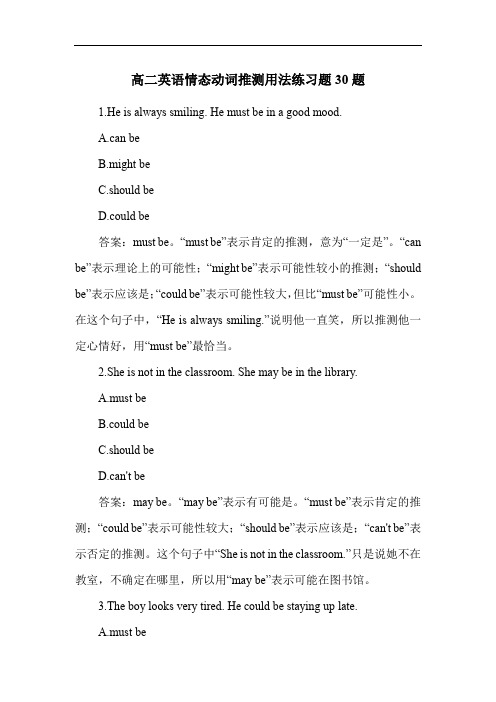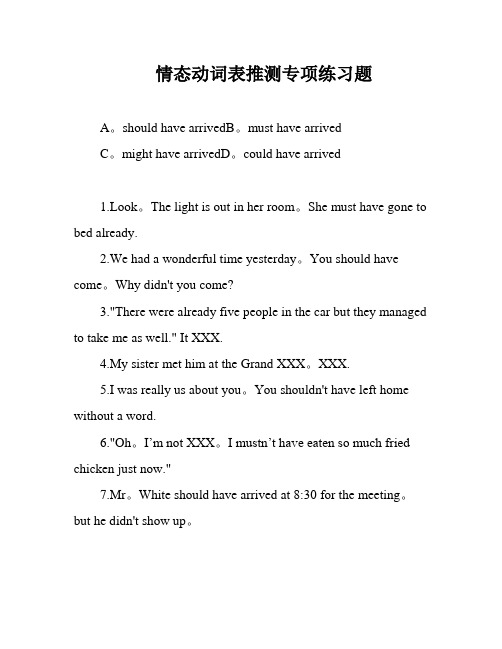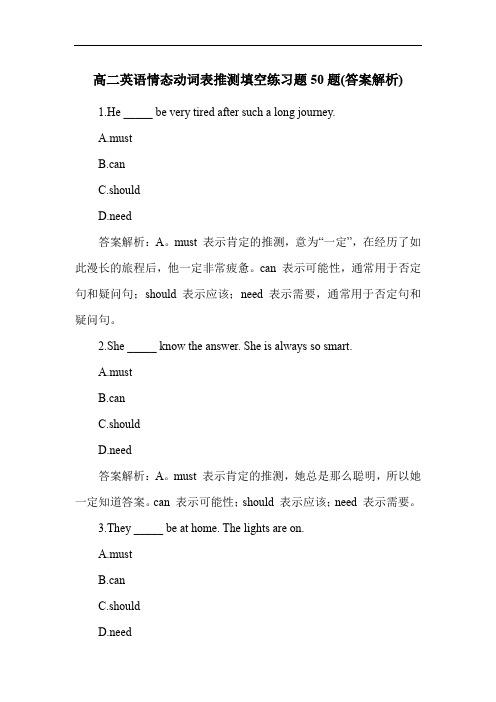情态动词表推测专项练习题
中考英语情态动词推测基础练习题40题(带答案)

中考英语情态动词推测基础练习题40题(带答案)1.There is a loud noise coming from the next room. It must be Tom. He is the only one there.A.must beB.can't beC.could beD.might be答案解析:A。
“must be”表示肯定的推测,根据题干中“There is a loud noise coming from the next room. He is the only one there.”可知,有很大的噪音从隔壁房间传来,并且他是那里唯一的一个人,所以可以肯定是汤姆。
“can't be”表示否定的推测,不符合题意;“could be”和“might be”表示可能性较小的推测,也不符合题意。
2.The book on the table isn't mine. It can't be mine.A.must beB.can't beC.could beD.might be答案解析:B。
“can't be”表示否定的推测,根据题干“The book on the table isn't mine.”可知,桌子上的书不是我的,所以用“can't be”。
“must be”表示肯定的推测,不符合题意;“could be”和“might be”表示可能性较小的推测,也不符合题意。
3.Look at that girl. She is singing so beautifully. She could be aprofessional singer.A.must beB.can't beC.could beD.might be答案解析:C。
“could be”表示可能性较大的推测,根据题干“Look at that girl. She is singing so beautifully.”可知,那个女孩唱歌很好听,有可能是专业歌手。
初一英语情态动词推测用法练习题30题(带答案)

初一英语情态动词推测用法练习题30题(带答案)1. The door is open. Someone ____ be in the room.A.mustB.canC.mayD.could答案解析:C。
“must”表示肯定的推测,语气非常强;“can”表示理论上的可能性;“may”表示有可能,语气较弱;“could”表示过去的可能性或委婉语气。
在这个场景中,门开着只能说明可能有人在房间,所以选择“may”。
2. There is a lot of noise coming from the classroom. The students ____ be having a discussion.A.mustB.canC.mayD.could答案解析:A。
“must”在这里表示比较肯定的推测,因为有很多噪音从教室传来,很有可能是学生们在进行讨论。
“can”和“could”表示可能性较小,“may”语气较弱。
3. Tom is not in the classroom. He ____ be in the library.A.mustB.canD.could答案解析:C。
“may”表示有可能,因为汤姆不在教室,只是有可能在图书馆,不能确定,所以选择“may”。
“must”语气太强,“can”和“could”也不太符合这个场景。
4. The light in the office is on. Someone ____ be working there.A.mustB.canC.mayD.could答案解析:C。
灯亮着只能说明有可能有人在办公室工作,“may”语气较弱,符合这个场景。
“must”太肯定,“can”和“could”也不太恰当。
5. There are some footprints on the ground. Someone ____ have walked here.A.mustB.canC.mayD.could答案解析:C。
高二英语情态动词推测用法练习题30题

高二英语情态动词推测用法练习题30题1.He is always smiling. He must be in a good mood.A.can beB.might beC.should beD.could be答案:must be。
“must be”表示肯定的推测,意为“一定是”。
“can be”表示理论上的可能性;“might be”表示可能性较小的推测;“should be”表示应该是;“could be”表示可能性较大,但比“must be”可能性小。
在这个句子中,“He is always smiling.”说明他一直笑,所以推测他一定心情好,用“must be”最恰当。
2.She is not in the classroom. She may be in the library.A.must beB.could beC.should beD.can't be答案:may be。
“may be”表示有可能是。
“must be”表示肯定的推测;“could be”表示可能性较大;“should be”表示应该是;“can't be”表示否定的推测。
这个句子中“She is not in the classroom.”只是说她不在教室,不确定在哪里,所以用“may be”表示可能在图书馆。
3.The boy looks very tired. He could be staying up late.A.must beB.might beC.should beD.can't be答案:could be。
“could be”表示可能性较大的推测。
“must be”表示肯定的推测;“might be”表示可能性较小;“should be”表示应该是;“can't be”表示否定的推测。
这里“The boy looks very tired.”只是看起来累,所以用“could be”表示可能熬夜了。
情态动词表推测专项练习题

情态动词表推测专项练习题A。
should have arrivedB。
must have arrivedC。
might have arrivedD。
could have arrived1.Look。
The light is out in her room。
She must have gone to bed already.2.We had a wonderful time yesterday。
You should have come。
Why didn't you come?3."There were already five people in the car but they managed to take me as well." It XXX.4.My sister met him at the Grand XXX。
XXX.5.I was really us about you。
You shouldn't have left home without a word.6."Oh。
I’m not XXX。
I mustn’t have eaten so much fried chicken just now."7.Mr。
White should have arrived at 8:30 for the meeting。
but he didn't show up。
1.It seems that the person has already gone to bed。
so the correct answer is "must have gone".2.The speaker had a great time and expected the other person to come as well。
so the correct answer is "should have come".3.XXX because there were too many people in the car。
中考英语情态动词推测基础运用练习题30题(答案解析)

中考英语情态动词推测基础运用练习题30题(答案解析)1. Look at the man over there. He ____ be a teacher. He is so patient with those children.A. mustB. mayC. can'tD. might答案解析:A。
must表示非常肯定的推测,根据句子中“He is so patient with those children”可以看出他对孩子们很有耐心,所以非常有可能是一名老师,这里用must很合适。
may和might表示可能性比较小的推测,can't表示否定推测,不符合语境。
2. The light in the room is on. There ____ someone in it.A. mustB. canC. mayD. should答案解析:A。
房间灯亮着,根据这个情况非常肯定房间里有人,must用于肯定句中表示很有把握的推测。
can表示能力或请求许可等,与推测关系不大;may表示可能,把握性没有must强;should表示应该,不用于推测。
3. Listen! The music coming from the hall. It ____ be a concert.A. mustB. mightC. can'tD. may答案解析:A。
听,有音乐从大厅传来,根据这个情况可以很肯定地推测出这里正在举办一场音乐会,must表示肯定的推测。
might 和may表示可能性较小的推测,can't表示否定推测,不符合语境。
4. She has a very expensive car. She ____ be very rich.A. mustB. canC. mayD. might答案解析:A。
她有一辆非常昂贵的汽车,从这一点可以很有把握地推测出她很富有,must用于这种比较肯定的推测。
中考英语情态动词推测基础运用练习题30题含答案解析

中考英语情态动词推测基础运用练习题30题含答案解析1.There must be someone in the classroom. The light is on.A.canB.mustC.mightD.could答案解析:B。
“must”在这里表示肯定的推测,语气最强,因为灯亮着,所以很肯定教室里有人。
“might”和“could”表示可能性较小的推测,“can”一般表示能力或可能性,在这里不太符合语境。
2.She can't be at home. She has gone to school.A.mustB.can'tC.mayD.could答案解析:B。
根据后一句“她去学校了”可知她肯定不在家,“can't”表示否定的推测,语气较强。
“must”表示肯定推测,这里不合适;“may”和“could”表示可能性较小的推测,也不符合。
3.The boy in blue look very tired. He must have stayed up late last night.A.mustB.can'tC.may答案解析:A。
“must”在这里表示肯定的推测,语气较强,因为男孩看起来很累,所以推测他昨晚肯定熬夜了。
“can't”表示否定推测,不符合;“may”和“could”可能性较小,没有“must”符合语境。
4.There may be some books on the desk.A.mustB.mayC.can'tD.could答案解析:B。
“may”表示可能性的推测,语气较弱。
“must”表示肯定推测,这里不确定书一定在桌子上;“can't”表示否定推测;“could”也表示可能性较小,但没有“may”正式。
5.He might be at the library.A.mustB.can'tC.mayD.might答案解析:D。
高考英语情态动词推测运用练习题20题

高考英语情态动词推测运用练习题20题1.He is always reading books. He must be very interested in literature.A.mustB.mayC.mightD.could答案:A。
“must”在这里表示肯定的推测,语气最强。
他总是在读书,所以一定对文学很感兴趣。
“may”“might”“could”虽然也可以表示推测,但语气较弱,不符合这里的语境。
2.She has a lot of knowledge about art. She could be an art major.A.mustB.mayC.mightD.could答案:D。
“could”在这里表示比较委婉的推测。
她有很多关于艺术的知识,有可能是艺术专业的。
“must”语气太强硬,“may”“might”也可以表示推测,但不如“could”委婉。
3.The man is wearing a suit and tie. He might be going to a formal event.A.mustB.mayC.might答案:C。
“might”在这里表示比较弱的推测。
这个男人穿着西装打着领带,可能是要去一个正式的活动。
“must”语气太肯定,“may”“could”也可以表示推测,但“might”更符合语境。
4.The room is very clean. She may have cleaned it.A.mustB.mayC.mightD.could答案:B。
“may”在这里表示有可能的推测。
房间很干净,她有可能打扫了。
“must”语气太强硬,“might”“could”也可以表示推测,但“may”更符合语境。
5.There are many books on the desk. He could be a student.A.mustB.mayC.mightD.could答案:D。
高二英语情态动词表推测填空练习题50题(答案解析)

高二英语情态动词表推测填空练习题50题(答案解析)1.He _____ be very tired after such a long journey.A.mustB.canC.shouldD.need答案解析:A。
must 表示肯定的推测,意为“一定”,在经历了如此漫长的旅程后,他一定非常疲惫。
can 表示可能性,通常用于否定句和疑问句;should 表示应该;need 表示需要,通常用于否定句和疑问句。
2.She _____ know the answer. She is always so smart.A.mustB.canC.shouldD.need答案解析:A。
must 表示肯定的推测,她总是那么聪明,所以她一定知道答案。
can 表示可能性;should 表示应该;need 表示需要。
3.They _____ be at home. The lights are on.A.mustB.canC.shouldD.need答案解析:A。
must 表示肯定的推测,灯亮着,所以他们一定在家。
can 表示可能性;should 表示应该;need 表示需要。
4.The book _____ belong to him. His name is on it.A.mustB.canC.shouldD.need答案解析:A。
must 表示肯定的推测,书上有他的名字,所以这本书一定属于他。
can 表示可能性;should 表示应该;need 表示需要。
5.He _____ be ill. He looks so pale.A.mustB.canC.shouldD.need答案解析:A。
must 表示肯定的推测,他脸色苍白,所以他一定生病了。
can 表示可能性;should 表示应该;need 表示需要。
6.The weather _____ be nice tomorrow. The forecast says so.A.mustB.canC.shouldD.need答案解析:A。
- 1、下载文档前请自行甄别文档内容的完整性,平台不提供额外的编辑、内容补充、找答案等附加服务。
- 2、"仅部分预览"的文档,不可在线预览部分如存在完整性等问题,可反馈申请退款(可完整预览的文档不适用该条件!)。
- 3、如文档侵犯您的权益,请联系客服反馈,我们会尽快为您处理(人工客服工作时间:9:00-18:30)。
1. Look! The light is out in her room. She————to bed already.
A. must go
B. had to go
C.must have gone
D.has gone
2. ─There were already five people in the car but they managed to take me as well.─ It______ a comfortable journey.
A. can“t be
B. shouldn“t be
C. mustn“t have been
D. couldn“t have been
3. My sister met him at the Grand Theatre yesterday afternoon, so he ___ your lecture.A. couldn“t have attendedB. needn“t have attended
C. mustn“t have attended
D. shouldn“t have attended
4. You ______ be tired - you“ve only been working for an hour.
A. must not
B. won“ t
C. can“ t
D. may not
5. - Isn“ t that Ann“s husband over there?
- No, it _______ be him -I“m sure he doesn“t wear glasses.
A. can“t
B.must not
C. won“t
D. may not
6. I was on the highway when this car went past followed by a police car. They______ at lease 150 km an hour.
A. should have been doing
B. must have been doing
C. could have done
D. would have done
7. He _____ have completed his w ork; otherwise, he wouldn’t be enjoying himself bythe seaside.
A. should
B. must
C. wouldn’t
D. can’t
8. This cake is very sweet. You __________ a lot of sugar in it.
A.should putB.could have putC.might putD.must have put
9.—Tom is never late for work. Why is he absent today?
—Something ________ to him.
A.must happenB.should have happened
C.could have happenedD.must have happened
情态动词must,can,could,may,might表推测的用法
情态动词中的must, can, could, may, might都表推测。
其中must的可能性最大,can / could次之,may / might最小。
详尽用法如下:
1.must的用法
(1)表示推测“可能性”时,意思是“一定、准是”,语气较肯定,较有把握He must be American. = It is certain that he is American.他准是个美国人。
(2)must表推测只能用于肯定句。
如果要表示“一定不、肯定不”的意思时,应用can`t,如询问某种可能时,应用can。
He must know my address.他肯定知道我的地址。
(一定)
He can`t know my address.他肯定不知道我的地址。
(一定不)
Can he know my address?他知道我的地址吗?(询问可能性)
(3)must表示推测时,可以推测现在/正在发生的动作/过去发生的动作。
He must have a car now.(现在)他一定有辆小汽车。
He must be doing his exercises in the classroom.(正在进行)他一定在教室里做练习。
He must have finished the work.(过去发生)他一定已完成了工作。
注:must表示推测时很少用于将来的情况。
大凡不用He must come tomorrow.可用It`s certain / I`m sure that he will come tomorrow.
(4)在反意疑问句中,当附属部分含有表示推测意义的must时,疑问部分的助动词应与must后面的动词在非推测情况下的用法保持一致。
He must be a worker, isn`t he?(现在)他准时个工人,是吗?
It must have rained last night, didn`t it?(过去)昨晚一定下雨了,是不是?
You must have learned English for many years, haven`t you?(完成时)你一定学了好多年英语,是吗?
2.can / could的用法
(1)can表示推测“可能性”时,往往用于否定句或疑问句。
Can`t“一定不”,语气很肯定。
can在疑问句中意思是“会、可能”。
He can`t be at home. = It is impossible that he is at home.他一定不在家。
(2)can /can`t后可接进行时/完成时,表示对现在发生的动作或过去发生的动作进行推测。
They can`t be reading in the library.他们一定不在图书馆读书。
He can`t have gone to Shanghai for I saw him a minute ago.
他不可能去了上海,我刚才还看见他。
It`s so late. Where can she have gone?天晚了,她可能去哪儿了呢?(3)在反意疑问句中,当陈述部分含有表示推测意义的can`t时,疑问部分的助动词应与can`t后面的动词在非推测情况下的用法保持一致.
He can`t be a teacher, is he?他不是教师,是吗?
She can`t have finished her homework, has she?
她一定没有完成家庭作业,是不是?
(4)could可用于表示某事有可能发生或可能是事实。
Don`t eat it. It could be poisonous.不要吃它,可能有毒。
The plane could be delayed by fog.飞机可能会因为雾晚点。
(5)could还可以用于表示客气、婉转、礼貌的请求语气。
Excuse me, could you tell me the way to the bus station?
Could you help me?
(6)couldn`t表示否定推测,表示某事不可能真实,或由于特定事实或环境某事肯定不会发生。
It couldn`t possibly be poison.这不可能是毒药。
注:有时与形容词的比较级连用强调某人或某物不可能再更多地具有某种属性You couldn`t be more wrong.你真是大错特错。
I couldn`t be happier.我简直是美满极了。
3.may和might的用法
(1)may, might表示推测“可能性”时,意思是“可能”、“也许”,语气没有must肯定。
He may / might be American. = It is possible that he is American.他可能是个美国人。
注:might不表示过去时态,只是语气上比may更婉转,表示的可能性更小。
(2)may, might表推测时,可以用于否定句,意思是“可能不、也许不”,但不用于疑问句。
He may / might not be at home.他也许不在家。
(3)may, might可以推测现在正在发生的动作或过去发生的动作。
He may / might be sleeping now.(现在)他可能正在睡觉。
The boy may / might not be watching TV at home.(现在)
这个男孩可能没在家看电视
These students may / might have seen the film before.(过去)这些学生以前可能看过这部电影。
(4)may, might还可以推测将来的情况。
I think we should take raincoat with us, it may rain.
我想我们应该带上雨衣,可能要下雨了。
She might not come this afternoon.她今天下午可能不来。
